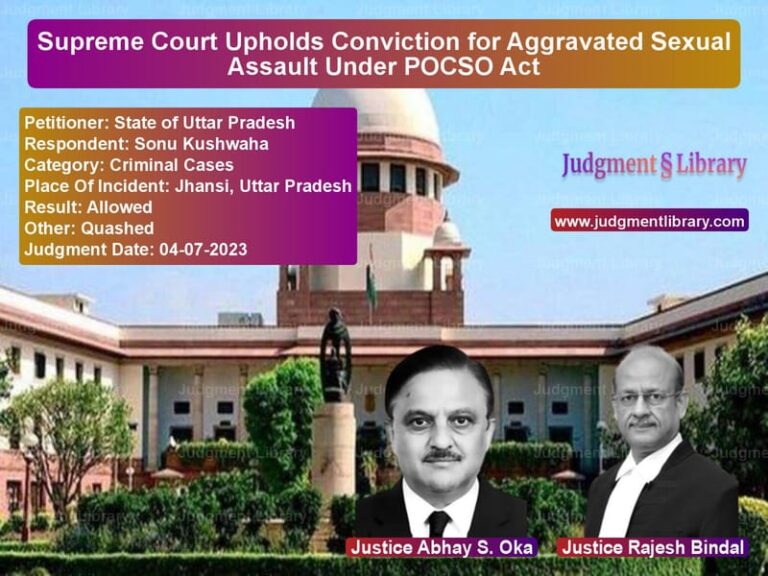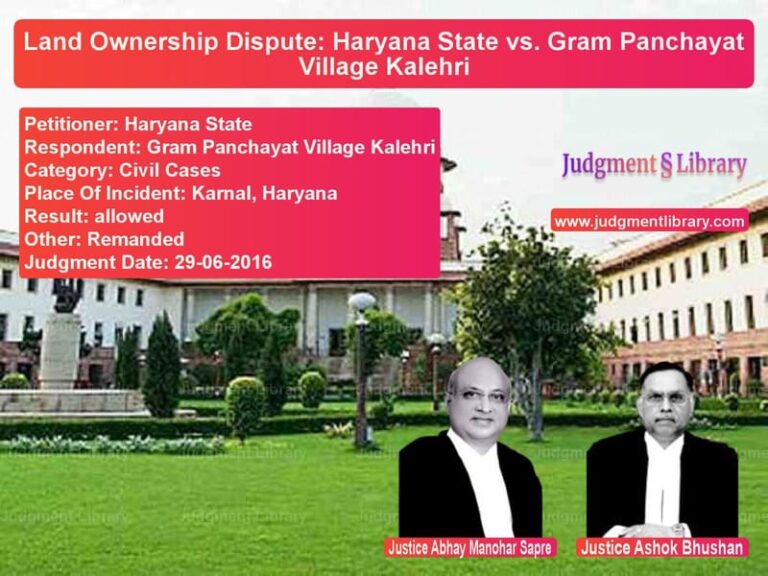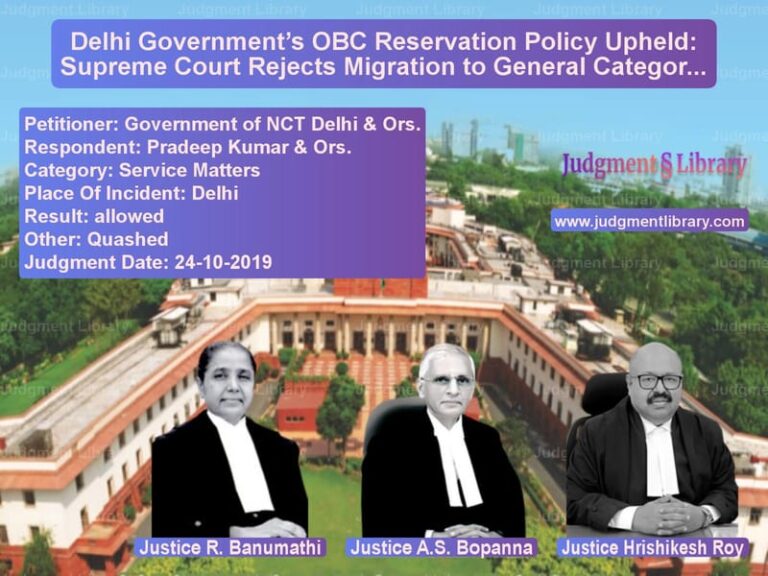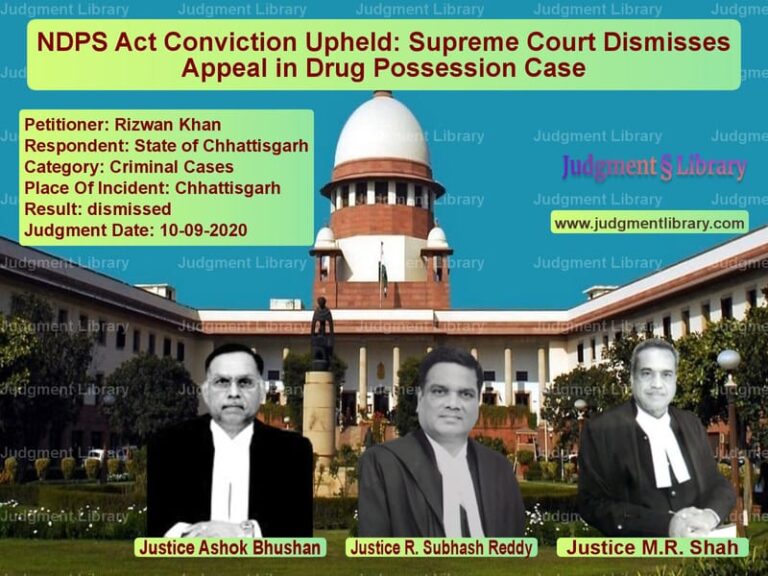Ganesh Prasad vs. Rajeshwar Prasad: Supreme Court Ruling on Mortgage Redemption and Possession
The case of Ganesh Prasad vs. Rajeshwar Prasad & Ors. is a significant legal battle concerning mortgage redemption and possession rights over a disputed shop property in Ballia, Uttar Pradesh. The Supreme Court’s ruling in this case clarifies legal principles related to amendments in pleadings, the limitation period for mortgage redemption, and the applicability of Order IX Rule 9 of the CPC.
Background of the Case
The dispute originated from a shop located in Block No. 2-5, A. No. 25, 26, 27, 28, 29 at Chowk, Ballia. The plaintiffs claimed ownership over the property, while the defendant contended that the property had been mortgaged to his father via a registered mortgage deed dated February 12, 1957.
Key events leading up to the Supreme Court proceedings include:
- 1957: The plaintiffs’ father allegedly mortgaged 1/3rd of the shop to the defendant’s father, who remained in possession.
- 2005: The defendant’s father passed away, and the defendant continued possession.
- 2007: The plaintiffs filed Small Cause Suit No. 3/2007, claiming tenancy rights and seeking eviction.
- 2010: The suit was dismissed for non-prosecution.
- 2009: The plaintiffs filed Suit No. 154/2009 in the Court of Civil Judge (J.D.), Ballia, seeking possession and redemption of the mortgage.
- 2015: The District Court allowed an amendment to the plaint, which was upheld by the High Court.
- 2023: The Supreme Court reviewed the case.
Arguments by the Appellant (Ganesh Prasad – Defendant)
The appellant challenged the amendment of the plaint and argued:
- The High Court erred in allowing an amendment that changed the entire nature of the suit.
- The original suit in the Small Causes Court treated the defendant as a tenant in arrears of rent, whereas the new suit sought mortgage redemption.
- The amendment violated Order IX Rule 9 of the CPC, as the earlier suit had been dismissed for non-prosecution.
- The amendment application was filed after three years, making it time-barred.
Arguments by the Respondents (Rajeshwar Prasad & Ors. – Plaintiffs)
The respondents defended the amendment and asserted:
- The suit for mortgage redemption was separate from the earlier tenancy dispute and thus not barred by Order IX Rule 9.
- The amendment merely clarified their legal claim rather than changing the nature of the suit.
- The right of redemption was still valid and had not been extinguished by limitation.
Supreme Court’s Judgment
The Supreme Court upheld the High Court’s decision to allow the amendment and ruled on key legal issues.
1. Amendment of the Pleadings
The Court reaffirmed that amendments should generally be allowed if they do not cause injustice to the other party. The Court cited previous rulings stating:
“All amendments ought to be allowed which satisfy the two conditions: (a) of not working injustice to the other side, and (b) of being necessary for determining the real questions in controversy between the parties.”
Since the amendment did not introduce a new cause of action but rather provided an alternative legal claim, it was deemed permissible.
2. Applicability of Order IX Rule 9 CPC
The Supreme Court rejected the argument that the suit was barred under Order IX Rule 9 CPC. It held that:
“For Order IX Rule 9 to apply, the cause of action in the second suit must be the same as in the earlier suit. Since the present suit was for redemption of mortgage and not for eviction, it was based on a different cause of action.”
The Court clarified that a suit for redemption of a mortgage cannot be barred merely because an earlier tenancy suit was dismissed for non-prosecution.
3. Right of Redemption
The Court ruled that the plaintiffs still had the right to redeem the mortgage, as it had not been extinguished under the Limitation Act, 1963. The defendant’s claim that his possession had converted into ownership through adverse possession was rejected.
Conclusion
The Supreme Court dismissed the appeal and directed the trial court to proceed with the suit for mortgage redemption and possession. This judgment reaffirms the principles governing amendments to pleadings, the scope of Order IX Rule 9, and the substantive rights of mortgagors under property law.
Petitioner Name: Ganesh Prasad.Respondent Name: Rajeshwar Prasad & Ors..Judgment By: Justice Sudhanshu Dhulia, Justice J.B. Pardiwala.Place Of Incident: Ballia, Uttar Pradesh.Judgment Date: 14-03-2023.
Don’t miss out on the full details! Download the complete judgment in PDF format below and gain valuable insights instantly!
Download Judgment: ganesh-prasad-vs-rajeshwar-prasad-&-o-supreme-court-of-india-judgment-dated-14-03-2023.pdf
Directly Download Judgment: Directly download this Judgment
See all petitions in Property Disputes
See all petitions in Landlord-Tenant Disputes
See all petitions in Contract Disputes
See all petitions in Specific Performance
See all petitions in Damages and Compensation
See all petitions in Judgment by Sudhanshu Dhulia
See all petitions in Judgment by J.B. Pardiwala
See all petitions in dismissed
See all petitions in supreme court of India judgments March 2023
See all petitions in 2023 judgments
See all posts in Civil Cases Category
See all allowed petitions in Civil Cases Category
See all Dismissed petitions in Civil Cases Category
See all partially allowed petitions in Civil Cases Category







